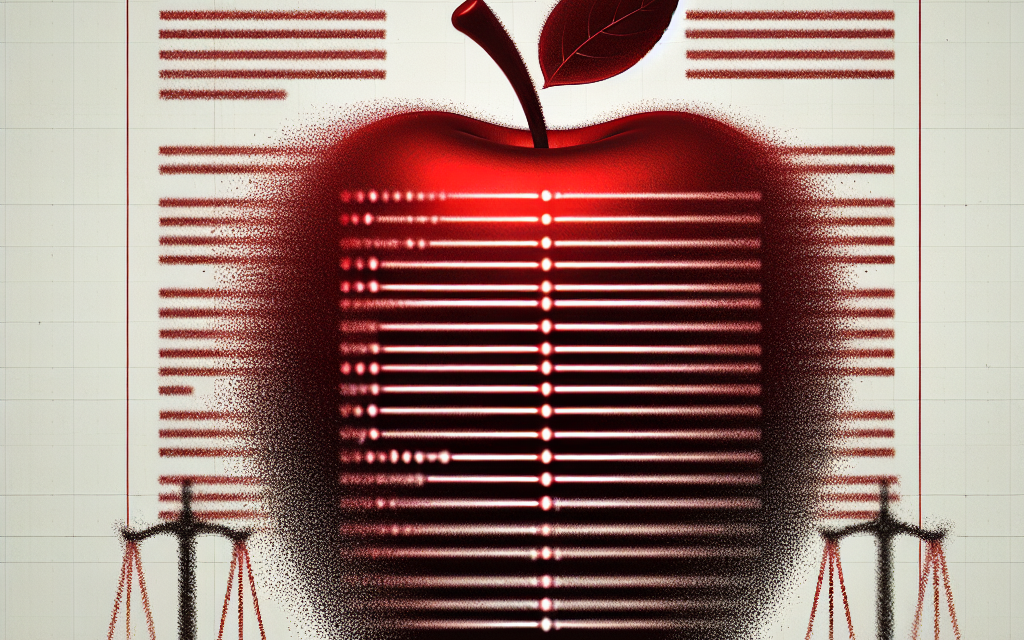“Apple Strengthens Siri Privacy Policies After $95 Million Class Action Settlement: Your Voice, Your Privacy.”
Introduction
Apple has reaffirmed its commitment to user privacy in the wake of a $95 million class action settlement related to its Siri voice assistant. The settlement stems from allegations that Apple collected and stored user recordings without proper consent, raising concerns about privacy practices. In response, Apple has emphasized its dedication to safeguarding user data and has implemented enhanced privacy measures for Siri. The company aims to restore consumer trust by clarifying its policies and ensuring that users have greater control over their data, reinforcing its long-standing stance on privacy as a fundamental right.
Apple’s Commitment to User Privacy
In an era where digital privacy concerns are at the forefront of consumer awareness, Apple has consistently positioned itself as a staunch advocate for user privacy. This commitment has been underscored by the recent $95 million class action settlement related to Siri, the company’s voice-activated assistant. Following this settlement, Apple has reaffirmed its dedication to maintaining robust privacy policies, emphasizing that user trust is paramount in its business model. The settlement arose from allegations that Apple had not adequately informed users about how their voice recordings were being handled, leading to concerns about unauthorized data collection and usage.
Apple’s response to these allegations has been multifaceted, focusing on transparency and user control. The company has made significant strides in ensuring that users are fully aware of how their data is collected, stored, and utilized. For instance, Apple has implemented features that allow users to manage their privacy settings more effectively, including options to delete voice recordings and opt out of data sharing. This proactive approach not only addresses the concerns raised in the lawsuit but also reinforces Apple’s long-standing philosophy that privacy is a fundamental human right.
Moreover, Apple has taken steps to enhance the security of its devices and services, ensuring that user data is protected from unauthorized access. By employing end-to-end encryption and minimizing data collection, Apple aims to create a secure environment where users can feel confident in their interactions with technology. This commitment to security is particularly relevant in light of increasing cyber threats and data breaches that have plagued many companies in recent years. By prioritizing user privacy and security, Apple differentiates itself in a competitive market, appealing to consumers who are increasingly wary of how their personal information is handled.
In addition to these technical measures, Apple has also engaged in public education efforts to inform users about their privacy rights. The company has launched campaigns aimed at raising awareness about the importance of data privacy and the steps users can take to protect their information. By fostering a culture of privacy awareness, Apple not only empowers its users but also cultivates a loyal customer base that values transparency and ethical practices.
Furthermore, the recent settlement serves as a reminder of the ongoing challenges that technology companies face in navigating the complex landscape of privacy regulations. As governments around the world implement stricter data protection laws, companies must adapt their practices to comply with these evolving standards. Apple’s proactive stance on privacy positions it favorably in this regulatory environment, as it has already established a framework that prioritizes user consent and data protection.
In conclusion, Apple’s reaffirmation of its privacy policies following the class action settlement highlights the company’s unwavering commitment to user privacy. By enhancing transparency, security, and user control, Apple not only addresses the concerns raised by the lawsuit but also reinforces its reputation as a leader in privacy advocacy. As consumers continue to demand greater accountability from technology companies, Apple’s proactive measures and dedication to ethical practices will likely resonate with users who prioritize their privacy in an increasingly digital world. Ultimately, this commitment not only strengthens user trust but also sets a standard for the industry, encouraging other companies to adopt similar practices in the pursuit of consumer confidence and loyalty.
Understanding the $95 Million Class Action Settlement
In recent developments, Apple has reaffirmed its commitment to user privacy in light of a significant $95 million class action settlement related to its virtual assistant, Siri. This settlement stems from allegations that Apple had not adequately disclosed how it collected and utilized user data, particularly in relation to voice recordings. The lawsuit highlighted concerns that users were not fully informed about the extent of data collection, which included audio recordings of their interactions with Siri. As a result, the settlement serves as a pivotal moment for both Apple and its users, emphasizing the importance of transparency in data handling practices.
The class action lawsuit, which was filed in 2020, accused Apple of violating privacy laws by retaining and using voice recordings without proper consent. Plaintiffs argued that the company failed to provide sufficient information regarding its data collection policies, leading to a breach of trust among its user base. In response to these allegations, Apple has taken steps to enhance its privacy policies, ensuring that users are more informed about how their data is managed. This includes clearer disclosures about data collection practices and the implementation of features that allow users to manage their privacy settings more effectively.
As part of the settlement, Apple has agreed to pay $95 million, which will be distributed among affected users. This financial compensation is intended to address the grievances of those who felt their privacy was compromised. However, the settlement goes beyond mere monetary compensation; it also represents a commitment from Apple to improve its privacy practices moving forward. The company has pledged to implement more robust measures to protect user data and to provide clearer information about how voice recordings are used and stored.
Moreover, the settlement underscores a broader trend in the tech industry, where companies are increasingly held accountable for their data privacy practices. As consumers become more aware of their digital rights, they are demanding greater transparency and control over their personal information. In this context, Apple’s proactive approach to revising its privacy policies can be seen as a strategic move to regain user trust and maintain its reputation as a leader in privacy protection.
In addition to the financial implications of the settlement, it also serves as a reminder of the ongoing challenges that technology companies face in balancing innovation with user privacy. As virtual assistants like Siri become more integrated into daily life, the need for clear and ethical data practices becomes paramount. Users expect that their interactions with these technologies will be handled with care and respect, and any missteps can lead to significant backlash, as evidenced by this lawsuit.
In conclusion, the $95 million class action settlement against Apple not only addresses past grievances but also sets a precedent for future privacy practices within the tech industry. By reaffirming its commitment to user privacy and enhancing its data handling policies, Apple aims to restore trust among its users while navigating the complex landscape of digital privacy. As the conversation around data protection continues to evolve, it is crucial for companies to prioritize transparency and accountability, ensuring that user rights are upheld in an increasingly digital world.
Implications of Siri’s Privacy Policies
In the wake of a significant $95 million class action settlement, Apple has reaffirmed its commitment to the privacy policies governing its virtual assistant, Siri. This development not only highlights the ongoing scrutiny surrounding digital privacy but also underscores the implications of Siri’s privacy policies for users and the broader tech industry. As consumers increasingly demand transparency and accountability from technology companies, Apple’s actions serve as a critical case study in the evolving landscape of digital privacy.
The settlement arose from allegations that Apple had not adequately informed users about how their voice recordings were collected and utilized. This situation prompted a reevaluation of Siri’s privacy practices, leading to a renewed emphasis on user consent and data protection. By reaffirming its privacy policies, Apple aims to restore consumer trust and demonstrate its commitment to safeguarding user data. This move is particularly significant in an era where data breaches and privacy violations have become alarmingly common, prompting consumers to be more vigilant about their digital footprints.
Moreover, the implications of Siri’s privacy policies extend beyond individual user experiences. As one of the leading technology companies, Apple’s approach to privacy sets a precedent for the industry at large. Other tech firms are likely to take note of Apple’s proactive stance, which may encourage them to enhance their own privacy measures. This ripple effect could lead to a more robust framework for digital privacy across the sector, ultimately benefiting consumers who are increasingly concerned about how their data is handled.
In addition to influencing industry standards, Apple’s reaffirmation of its privacy policies also reflects a broader societal shift towards prioritizing user privacy. As public awareness of data privacy issues grows, consumers are becoming more discerning about the products and services they choose. This shift is prompting companies to adopt more transparent practices, as failure to do so could result in reputational damage and financial repercussions. By taking a strong stance on privacy, Apple not only addresses the immediate concerns raised by the class action lawsuit but also positions itself as a leader in the ongoing conversation about digital rights.
Furthermore, the implications of Siri’s privacy policies are particularly relevant in the context of artificial intelligence and machine learning. As these technologies continue to evolve, the need for ethical guidelines surrounding data usage becomes increasingly critical. Apple’s commitment to privacy may serve as a model for how companies can responsibly leverage AI while respecting user autonomy. By prioritizing user consent and data protection, Apple demonstrates that it is possible to innovate while maintaining ethical standards.
In conclusion, Apple’s reaffirmation of Siri’s privacy policies following the $95 million class action settlement carries significant implications for both users and the technology industry as a whole. By addressing the concerns raised by the lawsuit, Apple not only seeks to restore consumer trust but also sets a precedent for privacy practices in the tech sector. As the demand for transparency and accountability continues to grow, Apple’s actions may inspire other companies to adopt similar measures, ultimately fostering a more secure digital environment for all users. In this rapidly changing landscape, the importance of robust privacy policies cannot be overstated, as they play a crucial role in shaping the future of technology and user experience.
How Apple Plans to Enhance Siri’s Privacy Features
In the wake of a significant $95 million class action settlement concerning privacy concerns related to its voice assistant, Siri, Apple has taken decisive steps to enhance the privacy features associated with its technology. This settlement, which arose from allegations that Apple had not adequately informed users about how their voice recordings were being handled, has prompted the company to reaffirm its commitment to user privacy. As a result, Apple is now focusing on implementing a series of improvements designed to bolster the privacy of Siri and reassure users about the security of their personal data.
To begin with, Apple is prioritizing transparency in its privacy policies. The company recognizes that users must be fully informed about how their data is collected, stored, and utilized. In response to the settlement, Apple has committed to revising its privacy documentation to ensure that it is clear and accessible. This initiative aims to provide users with a comprehensive understanding of the data practices associated with Siri, including the types of information collected and the duration for which it is retained. By enhancing transparency, Apple hopes to build trust with its user base and alleviate concerns regarding data misuse.
Moreover, Apple is exploring the implementation of more robust data anonymization techniques. Anonymization is a critical aspect of data privacy, as it helps to protect user identities while still allowing for the collection of useful data. By employing advanced algorithms that can effectively strip personal identifiers from voice recordings, Apple aims to minimize the risk of user data being linked back to individual users. This approach not only enhances privacy but also enables Apple to continue improving Siri’s functionality through data analysis without compromising user confidentiality.
In addition to these measures, Apple is also investing in user control over their data. The company plans to introduce new features that will allow users to manage their voice recordings more effectively. For instance, users will soon have the option to delete their voice recordings directly from their devices, providing them with greater autonomy over their personal information. This empowerment is crucial in fostering a sense of security among users, as they will have the ability to take proactive steps in managing their data.
Furthermore, Apple is committed to enhancing the security of its data storage practices. The company is exploring the use of end-to-end encryption for voice data, which would ensure that recordings are only accessible to the user and not to unauthorized parties. By implementing such security measures, Apple aims to create a more secure environment for users, thereby reinforcing its dedication to privacy.
As Apple moves forward with these enhancements, it is also engaging in ongoing dialogue with privacy advocates and experts. By seeking input from various stakeholders, Apple can better understand the concerns surrounding voice technology and privacy. This collaborative approach not only demonstrates Apple’s willingness to listen to feedback but also helps the company to stay ahead of potential privacy challenges in the rapidly evolving tech landscape.
In conclusion, Apple’s reaffirmation of its privacy policies following the class action settlement marks a pivotal moment for the company and its users. Through increased transparency, improved data anonymization, enhanced user control, and strengthened security measures, Apple is taking significant strides to enhance Siri’s privacy features. These initiatives not only aim to restore user confidence but also set a precedent for responsible data practices in the tech industry. As Apple continues to innovate, its commitment to user privacy will remain a cornerstone of its strategy, ensuring that users can enjoy the benefits of technology without compromising their personal information.
User Reactions to Siri’s Privacy Reaffirmation
In the wake of a significant $95 million class action settlement, Apple has taken steps to reaffirm its commitment to user privacy concerning its virtual assistant, Siri. This development has sparked a variety of reactions from users, many of whom have long been concerned about how their data is handled. The settlement, which arose from allegations that Apple had not adequately disclosed how it collected and used voice recordings, has prompted the company to clarify its privacy policies, aiming to restore user trust and confidence in its services.
Many users have expressed relief at Apple’s renewed focus on privacy, viewing the reaffirmation as a necessary step in addressing their concerns. For a considerable period, there has been a growing unease among consumers regarding the extent to which their personal information is collected and utilized by technology companies. In this context, Apple’s decision to emphasize its privacy policies is seen as a positive move, particularly in an era where data breaches and privacy violations have become alarmingly common. Users appreciate the transparency that Apple is striving to provide, as it aligns with their expectations for responsible data management.
Conversely, some users remain skeptical about the effectiveness of these reaffirmed policies. While Apple’s intentions may be genuine, there is a lingering doubt about whether such commitments will translate into tangible changes in practice. This skepticism is not unfounded, as many consumers have witnessed similar promises from other tech giants that ultimately failed to protect their privacy adequately. As a result, some users are calling for more robust measures and independent audits to ensure that Apple adheres to its stated policies. This desire for accountability reflects a broader trend among consumers who are increasingly demanding that companies prioritize their privacy and security.
Moreover, the settlement and subsequent policy reaffirmation have ignited discussions about the broader implications of voice-activated technology. Users are becoming more aware of the potential risks associated with using virtual assistants, leading to a more cautious approach to technology adoption. This shift in mindset is significant, as it encourages users to critically evaluate the tools they use daily and the data they share. As a result, some individuals are reconsidering their reliance on Siri and similar services, opting instead for alternatives that they perceive as more privacy-conscious.
In addition to these concerns, there is a segment of users who feel that the settlement and policy changes are merely a reaction to legal pressures rather than a genuine commitment to user privacy. This perspective suggests that while Apple may be taking steps to address privacy issues, the underlying motivations may not align with the best interests of consumers. Such sentiments highlight the complexity of the relationship between technology companies and their users, where trust is often contingent upon consistent and transparent practices.
Ultimately, the reactions to Apple’s reaffirmation of Siri’s privacy policies illustrate the nuanced landscape of user sentiment regarding data privacy. While many users welcome the changes as a step in the right direction, others remain cautious and demand further assurances. As technology continues to evolve, the dialogue surrounding privacy will undoubtedly persist, compelling companies like Apple to navigate the delicate balance between innovation and user trust. In this context, the ongoing scrutiny from users will play a crucial role in shaping the future of privacy policies and practices in the tech industry.
The Future of Voice Assistants and Privacy
In recent years, the rapid advancement of voice assistant technology has transformed the way individuals interact with their devices, leading to a growing reliance on these digital companions for everyday tasks. However, as the use of voice assistants becomes increasingly prevalent, concerns surrounding privacy and data security have emerged as significant issues. The recent $95 million class action settlement involving Apple and its Siri voice assistant has brought these concerns to the forefront, prompting the company to reaffirm its commitment to user privacy. This development not only highlights the importance of privacy in the realm of voice technology but also sets a precedent for how companies may navigate the complex landscape of user data in the future.
As voice assistants like Siri, Amazon’s Alexa, and Google Assistant become integral to daily life, users often overlook the vast amounts of data these systems collect. From voice recordings to user preferences, the information gathered can be extensive. Consequently, the potential for misuse or unauthorized access to this data raises legitimate concerns among consumers. In light of these issues, Apple’s recent settlement serves as a reminder that companies must prioritize transparency and user consent when it comes to data collection practices. By reaffirming its privacy policies, Apple aims to restore consumer trust and demonstrate that it values user privacy as a fundamental principle.
Moreover, the settlement underscores the necessity for companies to adopt robust privacy measures and to communicate these practices clearly to users. As the market for voice assistants continues to expand, consumers are becoming more discerning about how their data is handled. This shift in consumer awareness is likely to influence the development of future voice technologies, compelling companies to implement stricter privacy protocols and to provide users with greater control over their data. For instance, features that allow users to delete their voice recordings or opt out of data collection altogether may become standard offerings, reflecting a growing demand for privacy-centric solutions.
In addition to enhancing privacy measures, the future of voice assistants will likely involve a more nuanced understanding of user intent and context. As artificial intelligence and machine learning technologies evolve, voice assistants will become increasingly adept at interpreting user commands while respecting privacy boundaries. This evolution will not only improve the user experience but also ensure that sensitive information remains protected. Companies that successfully balance functionality with privacy will likely gain a competitive edge in the market, as consumers gravitate toward solutions that prioritize their security.
Furthermore, regulatory frameworks surrounding data privacy are expected to evolve in response to the growing concerns associated with voice technology. Governments and regulatory bodies are increasingly scrutinizing how companies collect, store, and utilize user data. As a result, organizations may face stricter compliance requirements, compelling them to adopt more transparent practices. This regulatory landscape will shape the future of voice assistants, as companies will need to align their operations with emerging legal standards while still innovating and enhancing their offerings.
In conclusion, the recent class action settlement involving Apple serves as a pivotal moment in the ongoing dialogue about privacy and voice assistants. As consumers become more aware of their data rights, companies must adapt by implementing robust privacy measures and fostering transparency. The future of voice technology will hinge on the ability of organizations to balance innovation with user privacy, ensuring that these digital assistants can continue to enhance our lives without compromising our security. As this landscape evolves, it is clear that the commitment to privacy will be a defining characteristic of successful voice assistant technologies moving forward.
Legal Perspectives on Tech Companies and User Privacy
In recent years, the intersection of technology and user privacy has become a focal point of legal scrutiny, particularly as consumers grow increasingly aware of how their data is collected and utilized. The recent $95 million class action settlement involving Apple and its virtual assistant, Siri, underscores the importance of privacy policies in the tech industry. This settlement not only highlights the legal challenges that tech companies face but also serves as a reminder of the ongoing dialogue surrounding user privacy rights in an era dominated by digital interactions.
As part of the settlement, Apple reaffirmed its commitment to user privacy, emphasizing that it has always prioritized the protection of personal information. This commitment is crucial, especially in light of the allegations that Siri was recording users without their explicit consent. Such claims raise significant legal questions about the extent to which tech companies can collect and store user data, as well as the transparency required in their privacy policies. The legal landscape surrounding user privacy is complex, with various regulations and laws governing how companies must handle personal information. For instance, the California Consumer Privacy Act (CCPA) and the General Data Protection Regulation (GDPR) in Europe impose strict guidelines on data collection and user consent, compelling companies to adopt more robust privacy measures.
Moreover, the settlement reflects a broader trend in which consumers are becoming more vigilant about their digital footprints. As awareness of data privacy issues grows, users are increasingly demanding accountability from tech companies. This shift in consumer sentiment has prompted many organizations to reevaluate their privacy practices and implement more stringent policies to safeguard user data. In this context, Apple’s reaffirmation of its privacy policies can be seen as a strategic move to restore consumer trust and mitigate potential legal repercussions in the future.
Furthermore, the legal implications of such settlements extend beyond the immediate financial impact on the company. They also set a precedent for how tech companies approach user privacy moving forward. As more cases emerge, the legal framework surrounding data privacy is likely to evolve, compelling companies to adopt more transparent practices. This evolution may lead to stricter regulations and increased scrutiny from both consumers and regulatory bodies, ultimately shaping the future of technology and user privacy.
In addition to the legal ramifications, the settlement also raises ethical considerations regarding the responsibilities of tech companies in protecting user data. As digital platforms become integral to daily life, the ethical obligation to respect user privacy becomes paramount. Companies must navigate the delicate balance between leveraging user data for innovation and ensuring that users feel secure in their interactions with technology. This ethical dimension is increasingly influencing public perception and can significantly impact a company’s reputation and market position.
In conclusion, the $95 million class action settlement involving Apple serves as a critical reminder of the legal and ethical challenges that tech companies face in the realm of user privacy. As the landscape continues to evolve, it is essential for companies to remain vigilant in their privacy practices and transparent in their communications with users. By doing so, they not only comply with legal requirements but also foster a culture of trust and accountability that is vital in today’s digital age. As consumers become more informed and assertive regarding their privacy rights, the onus is on tech companies to adapt and prioritize user privacy in their operations.
Q&A
1. **What was the reason for the $95 million class action settlement involving Apple?**
The settlement was due to allegations that Apple violated users’ privacy rights by improperly collecting and using data from Siri interactions.
2. **What specific privacy policies did Apple reaffirm following the settlement?**
Apple reaffirmed its commitment to user privacy, emphasizing that Siri data is anonymized and that users have control over their data.
3. **How will the settlement funds be distributed among affected users?**
The settlement funds will be distributed to users who can demonstrate they were affected by the alleged privacy violations, with individual payouts depending on the number of claimants.
4. **What changes, if any, did Apple announce regarding Siri’s data collection practices?**
Apple announced that it would enhance transparency around data collection and provide clearer options for users to manage their Siri data.
5. **Did Apple admit any wrongdoing as part of the settlement?**
No, Apple did not admit any wrongdoing as part of the settlement agreement.
6. **What impact does this settlement have on Apple’s reputation regarding user privacy?**
The settlement may raise concerns among users about Apple’s privacy practices, but the company continues to position itself as a leader in user privacy.
7. **What steps can users take to manage their Siri data following this settlement?**
Users can manage their Siri data through their device settings, where they can choose to delete Siri interactions and adjust privacy settings related to data collection.
Conclusion
Apple’s reaffirmation of Siri privacy policies following the $95 million class action settlement underscores the company’s commitment to user privacy and data protection. The settlement highlights the importance of transparency and accountability in handling user data, prompting Apple to reinforce its practices and reassure customers about the security of their personal information. This move not only aims to restore consumer trust but also positions Apple as a leader in prioritizing privacy in the tech industry.





